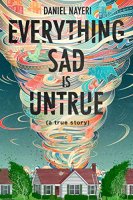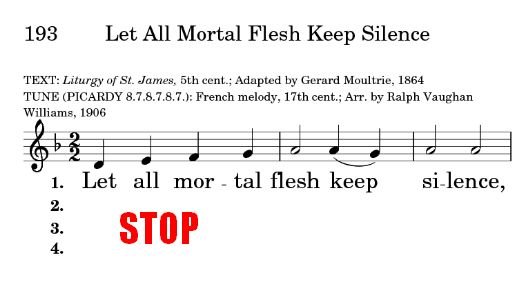Our church is having an event this New Year's Eve. I'm not thrilled, but we'll probably show up for a little while, since it starts early. But until the very end, it's just a party. I love the idea of starting the new year with a Communion service, but I have to confess I don't love it enough to stay up past midnight tonight. I'd have done that for a Christmas Midnight Mass (which we didn't have) but not on this night—being on the road on a night that our society dedicates to the abuse of alcohol seems just dumb.
That said, my favorite New Year's Eve event took place 30 years ago, at another church service: the baptisms of our children. It wasn't an Episcopal church, but we made it as much like the Episcopal service as we could. Including the baptismal candles, which they have made a point of relighting every New Year's Eve since then. As New Year's Eves go, that one is unsurpassable.
For a while, we enjoyed a quiet get-together with friends on the day, but our dislike of staying up late and driving with drunks on the road made that less attractive over the years. Sometimes we're with my brother's family in Connecticut at this time of year, and that's always great: lots of good food, an evening of game playing (for those who like games), a few Top Gear videos to watch together (back when Top Gear was good), and just being with family. We don't have to drive anywhere, and are free to doze on the couch whenever we feel like it. Good times.
But for the most part, this is my idea of a great New Year's Eve:
However you celebrate (or don't),
May God bless you greatly in 2023!
Permalink | Read 1011 times | Comments (1)
Category Everyday Life: [first] [previous] [next] [newest]
WARNING: If you have a particular fondness for President Biden's policies, or for the Christmas song, "Mary, Did You Know?" — then skip this post. It's impossible to write a blog, let alone comedy, without offending people, so I have to trust my readers to take what works for them and ignore the rest.
But if you like song paradies, this Babylon Bee offering is a great one. Especially if, like me, you are a fan of neither the song nor the policies. As with most paradies, you'll appreciate it more if you know the original song.
One Thanksgiving, during a family trivia game, I discovered that I know the first and often the second lines of quite a number of books, stories, and poems. That doesn't mean I've read them all, but that some beginnings are memorable. For instance,
- It was the best of times, it was the worst of times. (A Tale of Two Cities, Charles Dickens)
- Happy families are all alike; every unhappy family is unhappy in its own way. (Anna Karenina, Leo Tolstoy)
- Call me Ishmael. (Moby Dick, Herman Melville)
- As Gregor Samsa awoke one morning from uneasy dreams he found himself transformed in his bed into a gigantic insect. (Metamorphosis, Franz Kafka)
- In a hole in the ground there lived a hobbit. (The Hobbit, J.R.R. Tolkien)
- Heather had invented the game, but Picket made it magic. (The Green Ember, S.D. Smith)
To this collection I must add a new one. It's certainly not a book I've read, though I know some engineers who might have. As opening sentences go, these are pretty memorable. Who says textbooks have to be boring? If every author thought as much about the potential consequences of his writings as this CalTech physics professor, the world just might be a better place.
Ludwig Boltzmann, who spent much of his life studying statistical mechanics, died in 1906 by his own hand. Paul Ehrenfest, carrying on his work, died similarly in 1933. Now it is our turn to study statistical mechanics. Perhaps it will be wise to approach the subject cautiously. (States of Matter, David L. Goodstein)
Permalink | Read 837 times | Comments (0)
Category Just for Fun: [first] [previous] [next] [newest]
Having overheard someone questioning why Coventry Carol was included in our church's Lessons and Carols service earlier this month, I knew it was time to reprise our story of why this song of immeasurable grief belongs in this season of festive joy.
Coventry Carol is an ancient song that tells a story almost as old as Christmas. The events take place sometime after the birth of Christ—after the arrival of the Wise Men, from whom King Herod learns of the birth of a potential rival, and decides to do what kings were wont to do to rivals: kill him. Don't know which baby boy is the threat? No problem, just kill them all.
This song is a lament, a lullaby of the mothers of Bethlehem, whose baby boys would be killed in what came to be called the Massacre of the Innocents. (Jesus escaped, Joseph having been warned in a dream to get out of Dodge; the others are considered the first Christian martyrs—people whose association with Jesus led to their deaths.)
Lully, lullay, Thou little tiny Child,
Bye, bye, lully, lullay.
Lullay, thou little tiny Child,
Bye, bye, lully, lullay.
O sisters two, how may we do,
For to preserve this day
This poor youngling for whom we do sing
Bye, bye, lully, lullay.
Herod, the king, in his raging,
Charged he hath this day
His men of might, in his own sight,
All young children to slay.
That woe is me, poor Child for Thee!
And ever mourn and may,
For thy parting neither say nor sing,
Bye, bye, lully, lullay
Why sing such a gloomy song at Christmas?
Several reasons, maybe. Chief of which is that the Christian Christmas is not like the secular Christmas. It is, indeed, "tidings of great joy," but it is complicated, messy, profound, anything but simplistic and lighthearted. It breaks into the midst of a broken world, and even Jesus' escape from death here is only a short reprieve. There's more to Christmas than the joy of new birth, or even "peace on earth, good will to men." We have to tell the whole story.
Twenty years ago, as the world was beginning in earnest to "ring out the tidings of good cheer," our firstborn daughter gave birth to our first grandchild.
Isaac lived two days.
It was in that season of unspeakable grief that the haunting Coventry Carol touched me as none other could. Frankly, I could not handle all the happy songs about a newborn baby boy; with Coventry Carol I felt merged into an ancient and universal grief, the grief that made Christmas necessary.
Until the Day when all is set right, there will be pain and grief that won't go away just because the calendar says it's December. The last few years, especially, have wounded us all and broken not a few. This reminder that the First Christmas was not a facile Peace on Earth and Joy to the World, and that the first Christian martyrs were Jewish children, is for all whose pain threatens to overwhelm them.
Blessed are they that mourn: for they shall be comforted.
Permalink | Read 1120 times | Comments (4)
Category Children & Family Issues: [first] [previous] [next] [newest] Everyday Life: [first] [previous] [next] [newest] Music: [first] [previous] [next] [newest] Inspiration: [first] [previous] [next] [newest]
 Everything Sad Is Untrue: (a true story) by Daniel Nayeri (Levine Querido, 2020)
Everything Sad Is Untrue: (a true story) by Daniel Nayeri (Levine Querido, 2020)
Sometimes the AI—which Porter, seeing with eyes clearer than most, insists stands not for Artificial Intelligence but for Automated Idiots—sometimes the AI gets it right when it recommends a book for me. Usually it's 'way off base, nowhere near the skill of, say, my sister-in-law or my son-in-law in discerning what I might enjoy. But sometimes it makes a surprising score.
I was searching for a book for the above-mentioned son-in-law when Everything Sad Is Untrue popped up on Amazon. Nayeri's book caught my eye because the title echoes Sam's words near the end of The Lord of the Rings:
“Gandalf! I thought you were dead! But then I thought I was dead myself. Is everything sad going to come untrue?"
That was just enough to get me to click on the link. Which just goes to show how misleading titles can be. Still, it's not unfitting.
Everything Sad Is Untrue ticks off an awful lot of my "avoid-this-book" checkboxes:
- Modern fiction (published in 2020; anything less than 50 years old is modern to me and I find the signal-to-noise ratio very poor in that group)
- Young Adult fiction (what I said about poor signal-to-noise ratio goes a hundred-fold for YA fiction; I find most YA books insipid, narcissistic, and rarely appropriate for young people)
- Won "Best Book of the Year" from a whole slew of entities like NPR, the New York Times, Today, and Amazon (not organizations that inspire my confidence, rather the opposite)
- Has reviews that include accolades such as, "implementing a distinct literary style and challenging western narrative structures" and "urges readers to speak their truth" (phrases guaranteed to turn me off)
Despite all this, I clicked on Amazon's "Look Inside" and read the first few pages of the book. That actually made things worse, as the literary style is clearly "middle school Young Adult fiction," which, as you can guess, normally makes me run away, fast. And yet ... the story was intriguing enough, even in that small sample, to make me check it out of the library. I wouldn't have bought it, but this is one of the things libraries are good for.
And here's the thing: I don't care what the reviewers say, what the putative grade level is for the book, or how many middle school teachers assign it to their classes, this is not a Young Adult book. It's an adult semi-autobiography, written in the style of books aimed at middle-grade children. I say "semi-autobiography" because it's not written in a style normally associated with biographies, and it's classed as fiction. Here's what the author has to say about that:
I figure you want to know which parts are true. The short answer is all of it is true. I have changed the names of some people ... combined others ... and played a tiny bit with the timeline. But the elements are all—to my recollection—true.... Perhaps I misunderstood a great deal, in the way that a child misunderstands, but those are the myths I believed at the time. This was my life, as I experienced it, and it is both fiction and nonfiction at the same time.
Like poetry.
Daniel Nayeri, whose name was Khosrou until his mother got tired of Americans mispronouncing it, was born Persian, and if that makes you think of the Rubaiyat of Omar Khayyam and of Scheherazade I'm sure the author would be pleased. The son of a dentist and a doctor, he lived six years of a good life in Iran, until 1988 when his mother was forced to leave behind her husband and a thriving medical practice to flee with her two young children, a single suitcase, and a death-sentence fatwa on her head for the crime of having become a Christian.
Khosrou's tale is told through his childish memories, interwoven with tales of Persian folklore and Iranian culture. It's probably worth reading the book for that alone, because it doesn't assume much knowledge on the part of the reader. Those of us whose knowledge of modern Iran is largely limited to the tumultous and tragic times into which Khosrou was born can benefit from this more personal, if limited, glimpse. Anyone can benefit from this view of refugee life from a child's point of view. It's especially moving for me, because I know three people who fled Iran during that time, whose stories give credibility to Everything Sad Is Untrue.
Here's a 10-minute video with Daniel and his mother. It's well worth watching, whether you read the book or not.
A long time ago, Pontius Pilate famously asked, "What is truth?"
More recently, Elon Musk questioned, "What is the value of truth?"
A year ago, I picked and washed some fruit from our Page orange tree, then used a vegetable peeler to obtain thin slices of peel. These I put into a glass jar, which I then filled with plain vodka. That, plus time, produced an awesome orange extract.
It's not something I would drink—I wouldn't drink vodka anyway—but as a flavoring I say it's great, and I have the dark chocolate orange fudge to prove it.
This year's harvest is now mellowing in its vodka marinade, and I'm trying another as well, using peel from the Meyer lemons that were a gift from a friend. (The Meyer lemon, by the way, is a hybrid, 25% pomelo, 25% mandarin, and 50% citron; the Page orange is 25% grapefruit and 75% tangerine.)
"Let All Mortal Flesh Keep Silence" is a wonderful and ancient Eucharistic hymn particularly suited for this time of year. I love it in all of its verses. (See below)
However, there is a part of me that would really like to sing it this way:
Let all mortal flesh keep silence
and with fear and trembling stand;
ponder nothing earthly-minded,
for with blessing in his hand
Christ, our God, to earth descending,
comes our homage to command.
King of kings, yet born of Mary,
as of old on earth he stood,
Lord of lords in human likeness,
in the body and the blood
he will give to all the faithful
his own self for heav’nly food.
Rank on rank the host of heaven
spreads its vanguard on the way
as the Light from Light, descending
from the realms of endless day,
comes the pow’rs of hell to vanquish
as the darkness clears away.
At his feet the six-winged seraph,
cherubim with sleepless eye,
veil their faces to the presence
as with ceaseless voice they cry:
“Alleluia, alleluia!
Alleluia, Lord Most High!”
Permalink | Read 743 times | Comments (0)
Category Just for Fun: [first] [previous] [next] [newest]
Maybe you smoked some pot when you were young. Or know that your parents did. I did not, except second-hand and co-mingled with tobacco smoke, back in the days when our college movie theater—along with nearly everywhere else—put no restrictions on polluting the indoor air. I saw no reason to foul my lungs and risk fouling my brain. Maybe you think you survived your experiences unscathed. Maybe you did—though you will never know.
So maybe you think marijuana is harmless, remembering the fuss and scare-mongering from your youth. Maybe you are thrilled that in many places marijuana has "gone legit." But this is not your father's weed. Perhaps you thought that legalizing marijuana would take it out of the hands of the drug dealers, that it would be purer and safer.
Apparently not.
Truly, the love of money is a root of all sorts of evil. It seems we have not supplanted the illegal drug dealers and dishonest suppliers, but rather supplemented them with equally greedy mega-businesses, and replaced the lone marijuana plant or two growing in someone's apartment with chemical factories producing ultra-high-potency products that can maim and kill.
Here are two links to one family's story, the tragedy that alerted me to the problem.
Mila's Story, on Heather Heying's Natural Selections substack, and What Happened to Our Daughter; the latter is from the family's Slowdown Farmstead substack and tells the same story slightly differently, with more details about the drug problem (and lots of references). Be sure to notice how quickly Mila's mind disintegrated after her first encounter with the drug.
It wasn't just the marijuana that killed Mila. Suicide is always a complex event, with more than one contributing factor.
When you read Mila's story, you'll see that there's no shortage of guilty parties: the school drug counsellor to whom Mila went for help against the addiction that she knew was destroying her, whose response was merely to advise her to "moderate her use"; the First Nations reservation that supplied the dangerous drug "pens" to children, against which the Canadian government was apparently powerless; and most of all, the Canadian governments (federal and provincial) whose draconian COVID-19 restrictions left vulnerable high school students with literally nothing to do and no place to go. The Devil had a field day with those idle hands and minds.
We are just beginning to recognize what is certain eventually to be acknowledged as the truth: that the COVID closures, lockdowns, and travel restrictions, along with masking, social distancing, and vaccine mandates, have destroyed more individuals, families, and relationships than the COVID virus ever did.
Permalink | Read 918 times | Comments (0)
Category Hurricanes and Such: [first] [previous] [next] [newest] Health: [first] [previous] [next] [newest] Politics: [first] [previous] [next] [newest] Children & Family Issues: [first] [previous] [next] [newest]
I find Chick-fil-A's Evergreen Hills stories a much-needed breath of sanity in today's world. This year's is The Snow Globe, but I've put them in chronological order below, in case you missed any. The first three are each two minutes long, the new one just over seven.
If your spirits need lifting today, I hope you enjoy these. They're not going to change the world, but the most powerful forces on earth start small.
That's Christmas.
Permalink | Read 1034 times | Comments (1)
Category Inspiration: [first] [previous] [next] [newest]
 Inheritance: How Our Genes Change Our Lives—and Our Lives Change Our Genes by Sharon Moalem (Grand Central Publishing, 2014)
Inheritance: How Our Genes Change Our Lives—and Our Lives Change Our Genes by Sharon Moalem (Grand Central Publishing, 2014)
I've read 75 books so far in 2022, but my "to read" list just keeps getting longer. Not that I'm complaining. This one was a gift from my sister-in-law, who despite our literary tastes being very different, is very good at recognizing a book I'll probably enjoy. In this case, it helps that we are both genealogists.
Is this a critically important book to read? Probably not—at least not immediately. But it's fascinating to learn that while our inherited genes may be fixed, the expression of those genes is not, and what happens to us in life can indeed affect the genetic inheritance we pass on to our children. And with personal genome sequencing (far beyond what 23andMe has to offer) becoming more common and less expensive, I look forward—despite some privacy concerns—to the day when doctors will be able to be much more accurate in drug and dosage prescriptions, based on a patient's specific genes. It turns out that prescribed dosages tend to be based on averages, and thus sort of work, most of the time, for most people—while ranging from useless to fatal for others. Knowing a patient's specific DNA can turn that from a flashlight beam to a laser.
Inheritance will also give you even more appreciation for how "fearfully and wonderfully made" we are, how remarkable the human body is put together—and how the tiniest genetic changes can have effects ranging from unnoticeable to the hurricane that arises because of the flapping of a butterfly's wings.






